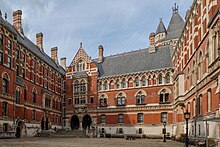English law
[9][d] Although Scotland and Northern Ireland form part of the United Kingdom and share Westminster as a primary legislature, they have separate legal systems outside English law.[17] The neo-Gothic Royal Courts of Justice in The Strand, London, were built shortly afterwards to celebrate these reforms.Formerly, most civil actions claiming damages in the High Court were commenced by obtaining a writ issued in the Queen's name.[21] After the Woolf Reforms of 1999, almost all civil actions other than those connected with insolvency are commenced by the completion of a Claim Form [22] as opposed to a writ, originating application, or a summons.Secondary (or "delegated") legislation in England includes: Statutes are cited in this fashion: "Short Title Year", e.g.It denotes, in the first place, the Anglo-Norman legal system that superseded and replaced Anglo-Saxon law in England following the Battle of Hastings in 1066.Throughout the Late Medieval Period, English law was codified through judge-made laws and precedents that were created in the proceedings of Royal justices in the Circuit courts dictated by the Eyres throughout the country (these themselves evolving from the early medieval Itinerant courts).[30] He states that the methodology of legal precedent and reasoning by analogy (Qiyas) are similar in both the Islamic and common law systems.In other words, no comprehensive codification of the law has taken place and judicial precedents are binding as opposed to persuasive.If a statute is ambiguous, then the courts have exclusive power to decide its true meaning, using the principles of statutory interpretation.[38][39] As Parliament became ever more established and influential, Parliamentary legislation gradually overtook judicial law-making, such that today's judges are able to innovate only in certain, very narrowly defined areas.[r] Even after independence, many former British colonies in the Commonwealth continued to use the Privy Council, as it offered a readily available high-grade service.The English law of salvage,[42] collisions,[43] ship arrest,[44] and carriage of goods by sea[45] are subject to international conventions which Britain played a leading role in drafting.Although Scotland and Northern Ireland form part of the United Kingdom and share the Parliament at Westminster as the primary legislature, they have separate legal systems.A major difference is use of the Welsh language, as laws concerning it apply in Wales and not in the rest of the United Kingdom.




Law of the United KingdomWelsh lawWales-only lawsEnglish law (disambiguation)Royal Courts of JusticeStrandLondonHigh Court of JusticeCourt of Appealcommon lawlegal systemEngland and Walescriminal lawcivil lawcourtsproceduresindependentfairnessequality before the lawright to a fair triallegislationActs of Parliamentregulationsby-lawsstare decisisjudgesstatutory lawreasoningearlierdecisionsEquityParliamentcodificationmurderInternational treatiesEuropean UnionTreaty of RomeHague-Visby Rulesparliamentary sovereigntyR (Miller) v Secretary of State for Exiting the European UnionLady JusticeCentral Criminal Court of England and WalesCity of LondonOld Baileyenforceable claimremedydamagesdeclarationcodifiedRoman lawcase lawKing's BenchCourt of Chancerytrustsequitable remediesmaxims of equityJudicature Actsneo-Gothiccompensationself-helpabate a private nuisanceHigh CourtWoolf ReformsSources of lawWilliam BlackstoneCourt of King's Benchprecedent decisionsBooks of authorityEuropean Union lawBrexitActs of the Scottish ParliamentActs of the SeneddActs of the National Assembly for Walesmeasures of the National Assembly for WalesStatutory rulesNorthern Ireland AssemblyOrders in Councilsui generisStatutory instrumentsministerial ordersmetropolitan boroughscounty councilstown councilsShort TitleTheft Act 1968long titleregnal yearparliamentary sessionroyal assentPleading in English Act 1362pleadingsLaw French36 Edw. 3Edward IIICivil Rights Act of 1964Anglo-Saxon lawBattle of HastingsLate Medieval PeriodCircuit courtsItinerant courtsPollockMaitlandBlackstoneCourt of Common PleasUnited KingdomUnited StatesCanadaAustraliaNew ZealandSouth AfricaSingaporeIndian SubcontientIsraelSupreme Court of Judicature Actsecclesiastical courtsAdmiralty courtOxford English DictionaryNorth Carolina Law ReviewIslamic lawcontractassize of novel disseisinMalikiIslamic jurisprudenceNormansRoger II in SicilyHenry II in England